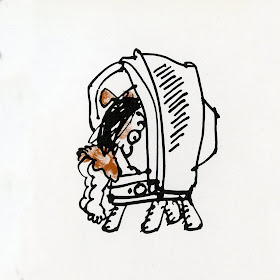Here at the good ol' Illustration Art blog, we have great respect for words. However, every once in a while it's good to remind ourselves that pictures do thing that words cannot.
Lines can be fashioned into letters of the alphabet, or they can be set free to play in the wilder meadows of drawing. If lines are hardened into letters, their function becomes clear and unavoidable: to form words and sentences, marching
in straight rows, obeying the commands of their master, punctuation. But when a line is still free and retains its
original primordial wildness, it can do countless things in countless ways.
For example, you might use words to convey a message such as "television corrupts youth." But look at how the line of the great Lou Myers plays with the same theme:
You can't do that with words.
Lines that have been civilized into letters and words can
never return to their pagan state. Language is rule defined, so it becomes
unintelligible as it approaches chaos. But the lovely, wild line of art
remains at home in chaos.







"You can't do that with words."
ReplyDeleteBut David, you just did!:
"television corrupts youth."
Not sure I agree, Chris.
ReplyDeleteI think only a very small portion of this sequential goes to saying "television corrupts youth." Rather, the piece is really only referencing this cliché as a starting point for the funniness.
So the bulk of the content is everything that is funny about how the cliché is given specificity and aesthetic life through the drawings, plus the movement implied between the panels that suggests the sequences of events.
Funny is content.
That’s a good point. And you’re right. I hadn’t seen that part.
ReplyDeleteIt becomes interesting therefore to think of how what happens between the panels is different from would happen between sentences. Girl watching TV. Girl drawn closer to TV. Girl climbs into TV. TV eats girl. TV alone in room digesting. Debauched teenager emerges from TV.
It just ain’t as funny as the captions…
Perhaps it's something to do with our thrill that, in finding it funny, we have correctly interpreted the pictures… Maybe. Hmmm. Interesting.
Chris Bennett-- You're not going to force me to list in words the things that can't be done with words, are you?
ReplyDeleteAll right, all right. I suppose that in a long, written description one might inventory the most important visual elements of Myers' little message. Yes, it is possible to say in words, "the child is drawn to TV" or if you are writing metaphorically, "the child is physically pulled into the actual TV," or if you are writing surrealistically or for a fantasy publication, "the man reached out of the TV and grabbed her." But you will never quite match the startling surprise of the man popping out because the linear flow of words can never match the jarring impact of an instantaneous image. But let's put that aside for a moment.
Look at what Myers does to make his point so devastatingly. The TV leans forward on its two front legs as the man leaps out at her (and she jumps back). The man has a crazed, google-eyed expression (if an author had written, "crazed, google-eyed expression" in a book, would you have envisioned Myers' wonderful face with those eyebrows and huge leering smile?) Much of the greatness of this piece is that the man doesn't just pull her into the TV, he stuffs her into his own gaping mouth, with her bare butt and her little legs wiggling outside. If someone had written such a thing in words, you wouldn't you scratch your head and say, "Wait a minute, just how big is this guy's mouth and how could she possibly fit? Myers, with the elasticity of line, can make this guy's mouth temporarily bigger than his head. And Myers tells you, with scribbled lines, other important information about this little transaction: the guy is smiling all the time-- he never frowns or growls as he snatches her and gobbles her down. (In fact, he never even loses his smile when he has to distend his mouth like a boa constrictor to eat her-- that's hard to do). Also, he has huge teeth which remain prominent despite his smile. Them there's that moment of silence after she has disappeared into the TV-- you could write, "all remained quiet as people wondered what ghastly things were happening to the little girl inside" but it wouldn't have the same ominous impact as Myers' plain drawing of a TV by itself. Or take a look at the wonderful visual cues that Myers used to show her corruption; the cigarette and heels were obvious, but that hand on her hip conveying a prostitute's attitude is a master stroke (contrasted with the same little hand with a thumb in her mouth in the first panel). How would you write that? "She had her hand on her hip"? What would those words convey? There are dozens of lines to talk about here-- her heavy eyelids for example-- but the best way to make my point is to say "look at the eyelids" rather than try to explain them in words-- which is kind of my larger point.
Kev Ferrara-- Agreed, the specificity and aesthetic life is where the action is (both for writing and for pictures).
The right few words can show worlds, and the right little drawings can as well. Just not always the same worlds.
ReplyDeleteLou Myers is forgotten today but he was a great talent.
ReplyDeleteFunny!
ReplyDelete